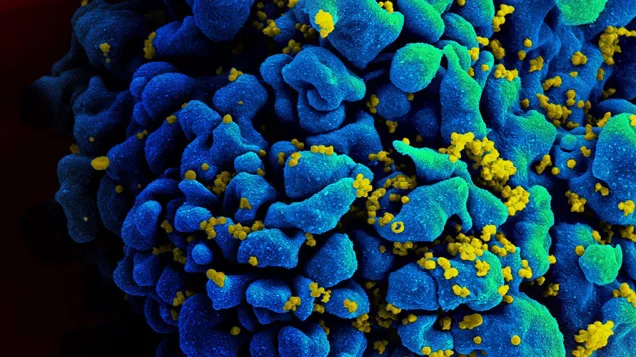Protect your health this summer: ECDC urges vigilance against rising STI cases
The warning comes as data from ECDC, released in March 2024, revealed concerning trends in the transmission of infections such as chlamydia, gonorrhoea and syphilis, all of which increased in reported cases. This uptick serves as a stark reminder of the ongoing risks posed by unprotected sexual activity and the need for a better understanding of the importance of safer sex.
As summer travel and festival season bring people from across Europe together, it is essential to be aware of the spread of STIs, know where one can get tested regularly, and how to seek reliable information from healthcare professionals.
ECDC emphasises the importance of safer sex practices, including consistent condom use for vaginal, anal, and oral sex. Getting tested for STIs is recommended before having sex without a condom with new partners, as many infections can be asymptomatic. If that is not possible, it is important to get tested after having sex without a condom, even if there are no visible symptoms.
Aside from chlamydia, gonorrhoea and syphilis, other infections can be spread through close contact and sexual activity. Men who have sex with men are at risk for mpox, for example, which is primarily transmitted through skin-to-skin contact, including during sex. Mpox may also be transmitted to others even before symptoms start.
ECDC also reports that some infections that cause severe diarrhoea – such as Shigella and Hepatitis A, also spread among men who have sex with men. To prevent these, use disposable gloves for fingering or fisting, dental dams during oral-anal sex, as well as changing condoms between anal and oral sex. It is recommended that people do not share sex toys and ensure proper cleaning and disinfection after their use, and between partners. It is also important to wash hands, genital and anal areas before and after sexual contact. If experiencing diarrhoea, it is important to avoid sexual activity and seek health care.
Consulting with healthcare providers for vaccinations (against hepatitis A, hepatitis B and mpox) and preventative measures, such as Pre-Exposure Prophylaxis (PrEP) for HIV prevention, can help reduce the risk of infection.
Considering the recent increase in STI cases, ECDC underscores the importance of taking proactive steps to protect one's sexual health. By prioritising preventive measures, staying informed, and fostering open communication with partners and health professionals, individuals can help curb the spread of STIs, HIV, mpox and viral hepatitis and promote healthier outcomes for themselves and their communities.
Resources
STIs

The European Centre for Disease Prevention and Control (ECDC) has published its latest Annual Epidemiological Reports shedding light on the state of sexually transmitted infections (STIs) in the European Union/European Economic Area (EU/EEA).

Every year, more than 300 000 sexually-transmitted infections (STIs) are notified in the EU/EEA.

On this episode, we are joined by Otilia Mårdh, Medical Epidemiologist at ECDC, to discuss the latest reports on sexually transmitted infections in Europe.

Lina Nerlander, Principal Expert - STIs, explains the current situation with bacterial sexually transmitted infections in Europe.
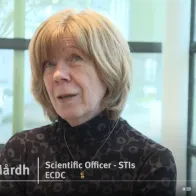
Otilia Mårdh, Scientific Officer - STIs, explains the potential health complications of untreated bacterial STIs.

Mpox
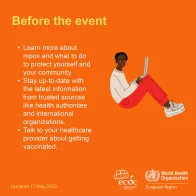
Social media cards explaining about mpox for those planning to attend a pride event or a similar gathering.
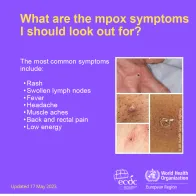
Social media cards explaining what you need to know about mpox, the symptoms and how it spreads.

Mpox (previously known as monkeypox) is not a newly discovered disease. The 2022 outbreak however showed that it may spread through a completely different route.

Agoritsa Baka joins us to discuss the monkeypox outbreak that has seen many cases in Europe. Agoritsa explains mpox, its origin, and how to keep safe.
HIV/AIDS

You may already know about PrEP, but did you know there is also PEP - the post-exposure prophylaxis - that is used after one may have been exposed to the HIV virus.

HIV continues to affect the health and wellbeing of people in Europe. In 2020, 14,971 new HIV diagnoses were reported in 29 countries of the EU/EEA.
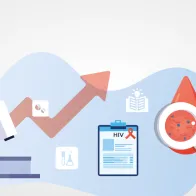
Juliana Reyes, ECDC's Expert in Communicable Diseases Prevention and Control, discusses the main challenges in addressing HIV/AIDS in Europe.
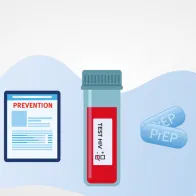
Anastasia Pharris, ECDC's Principal expert in Communicable Diseases, discusses the latest developments in HIV testing and detection.

Every year World AIDS Day is marked on the 1st of December. Beginning in 1988 as the first-ever international day for global health, it is now in its 35th year.
Share this page



